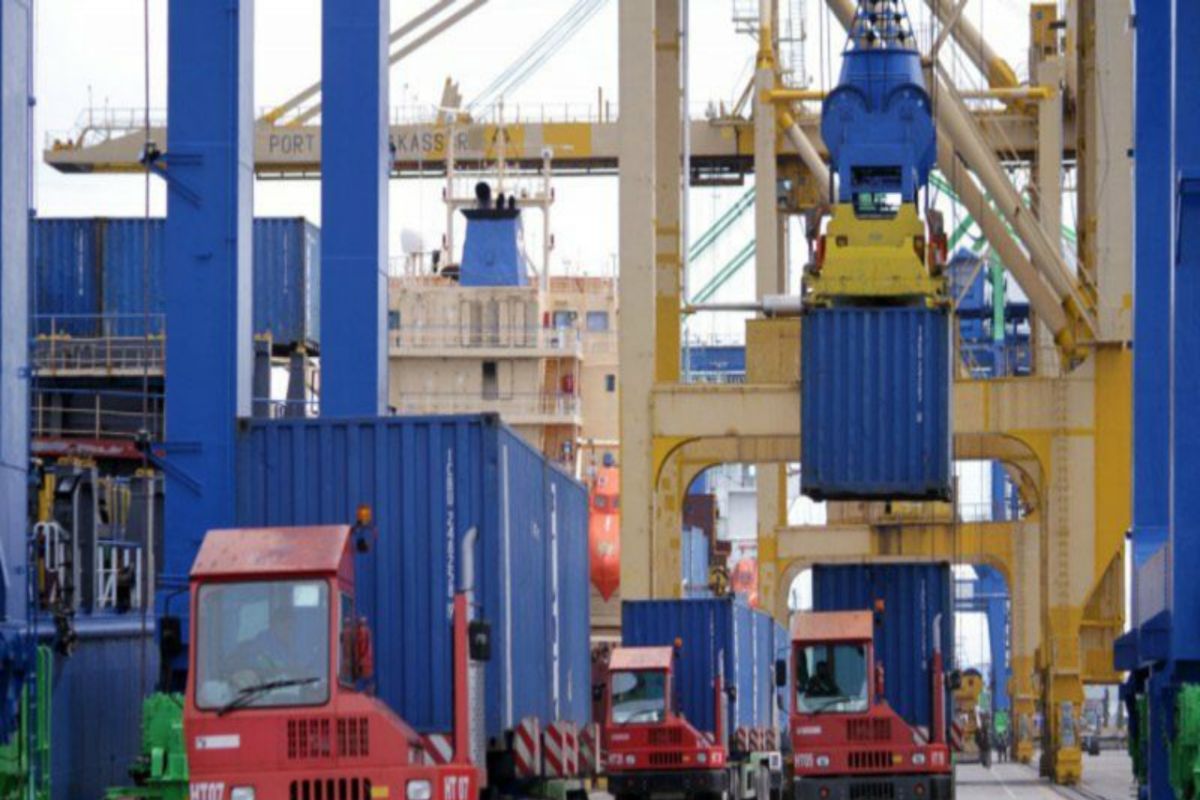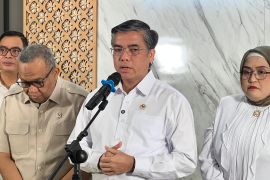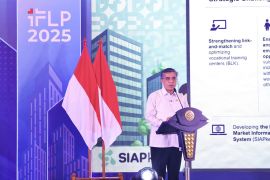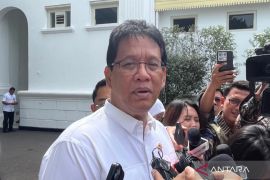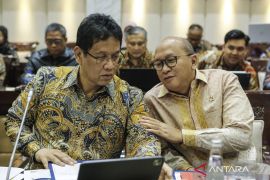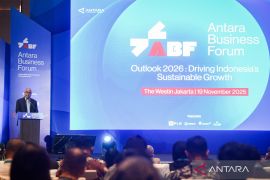Ongoing geopolitical conflicts, such as in the Middle East, could increase the risks of a commodity price surge, which could potentially hinder the progress made in controlling inflation.
The spike in inflation in the past few months and the continued strong economic performance of the United States (US) have fueled expectations of high global interest rates for a longer period, causing the US dollar to strengthen and putting pressure on developing countries.
Apart from increasing borrowing costs, hikes in US interest rates or Fed Fund Rate (FFR) policies have put significant pressure on financial markets in several countries, pushing capital outflows and causing depreciation of local currencies, especially in emerging market countries.
Though the global economy has shown resilience and is projected to continue to grow, the growth is expected to slow for several years.
Bank Indonesia (BI) has estimated global economic growth of 3 percent in 2024 amid high uncertainty in the financial market.
Furthermore, inflation in developed countries, such as the US, has remained above the target.
According to the January 2024 update of the World Economic Outlook (WEO) report released by the International Monetary Fund (IMF), the global economy is predicted to grow 3.1 percent in 2024, or 0.2 percentage points higher than the previous projection made in the WEO of October 2023.
It has been projected that global growth in 2024–2025 will remain below the historical average (2000–2019) of 3.8 percent, with high central bank interest rates reducing inflation rates, withdrawal of fiscal support amid high debt weighing on economic activity, and low basic productivity growth.
Meanwhile, global inflation is projected to decline to 5.8 percent in 2024 and 4.4 percent in 2025. The projected rate for 2025 is lower than the previous forecast.
However, Indonesia's economy has managed to show good performance, with growth of 5.05 percent recorded in 2023, supported by strong domestic demand and moderate inflation.
According to Finance Minister Sri Mulyani Indrawati, the country's fiscal policy has been effective in steering the economy in the aftermath of the COVID-19 pandemic and the current global shock.
Indonesia is among the few countries whose fiscal position has continued to improve significantly. The nation's fiscal deficit declined significantly from 6.1 percent of the gross domestic product (GDP) during the pandemic in 2020 to 1.65 percent in 2023. Thus, the debt-to-GDP ratio continued to fall.
Indonesia's short-term economic prospects remain strong. This resilience is reflected in the Purchasing Managers' Index (PMI), which has continued to show expansion, with the manufacturing index reaching a level of 54.2 in March 2024.
In terms of demand, consumer confidence remains robust, with the Consumer Confidence Index in the optimistic zone at 123.8 as of March.
Domestic demand
The resilience of the Indonesian economy amid increasing global uncertainty has also been reflected in the economic growth in the first quarter of 2024, which stood at 5.11 percent year on year (yoy), higher than the 5.04 percent yoy growth recorded in the previous quarter.
According to the director of the BI's communication department, Fadjar Majardi, this year, national economic growth is projected to remain strong in the range of 4.7 percent to 5.5 percent yoy, supported by domestic demand, especially continued growth in consumption and investment in building infrastructure, in keeping with the continuity of National Strategic Projects (PSN).
The higher economic growth in the first quarter of 2024 was supported by higher domestic demand. Household consumption grew by 4.91 percent yoy on account of the 2024 General Elections, national holidays, and collective leave.
The consumption of Non-Profit Institutions Serving Households (LNPRT) was high at 24.29 percent yoy, driven by activities related to the General Elections and the Islamic holy month of Ramadan.
Government consumption swelled 19.90 percent yoy, driven by an increase in goods spending, especially related to the implementation of the 2024 General Elections Spending and government workers' spending.
Investment grew 3.79 percent yoy, especially investment in building infrastructure — in line with the continuity of infrastructure development.
Meanwhile, export growth slowed by 0.50 percent yoy, especially goods exports, in keeping with the decline in the prices of main export products and amid demand from several main trading partners, which continued to grow.
Increased economic growth was also reflected in the business and spatial aspects.
In terms of business sectors, almost all sectors showed positive performance with high growth in the first quarter, including those related to mobility, especially transportation and warehousing, provision of accommodation and food and drink, as well as wholesale and retail trade.
The processing industry, as the main contributor to growth, also grew well on the back of sustained domestic and global demand.
Spatially, economic growth in the first quarter in most regions of Indonesia, except Sumatra and Java, was higher than in the previous quarter.
The highest growth was recorded in Sulawesi-Maluku-Papua (Sulampua), followed by Kalimantan, Bali-Nusa Tenggara (Balinusra), Java, and Sumatra.
Meanwhile, Indonesia's inflation rate was maintained in line with the target of 2.5 percent plus minus one percent. According to data from Statistics Indonesia (BPS), in April 2024, annual inflation reached 3 percent yoy, while calendar-year inflation was recorded at 1.19 percent year to date.
For inflation control, policy coordination between the central government and the governments of several regions is continuing to be improved under the National Food Inflation Control Movement (GNPIP) by the central and regional inflation control teams.
Overall, Indonesia's financial system stability was maintained in the first quarter, supported by fiscal and monetary policies and a stable financial sector. The positive performance was bolstered by a resilient financial system and sustained domestic consumption, especially during the General Elections period and religious holidays.
However, fast-changing global dynamics must continue to be monitored to maintain sustainable economic growth. Several global risks will still need to be faced in the future, including the direction of the US central bank or the Fed's policy, especially its benchmark interest rate, escalation of geopolitical tensions, and global supply chain disruption that has not yet fully recovered.
To this end, monetary and fiscal policy coordination is continuing to be strengthened to maintain the stability of the macroeconomy and the momentum of economic growth.
Policy synergy among members of the Financial System Stability Committee (KSSK) is continuing to be pushed to maintain the stability of the financial system and boost credit or financing to businesses.
The KSSK will continue to carry out forward-looking assessments of the latest economic and financial sector performance, in line with the risk posed by increasing global economic uncertainty and geopolitical turmoil.
The committee is committed to continuing to bolster coordination and synergy as well as increase vigilance against the risks of uncertainties in the global economic and financial market as well as geopolitical turmoil, including their impact on the domestic economic and financial sectors.
The KSSK comprises the Minister of Finance, the Governor of Bank Indonesia (BI), head of the board of commissioners of the Financial Services Authority (OJK), and head of the board of commissioners of the Indonesia Deposit Insurance Corporation (LPS).
Therefore, through collaboration, synergy, and quick response of institutions and stakeholders, as well as support from the community, Indonesia can continue to anticipate and face the risks of impacts from global uncertainties and turmoil on the country's economic growth.
These could help Indonesia continue on the economic growth path amid shifting global dynamics.
Related news: BI sees economy growing above 5% in Q2
Related news: 5.11% economic growth stoking optimism: Widodo
Editor: Rahmad Nasution
Copyright © ANTARA 2024
